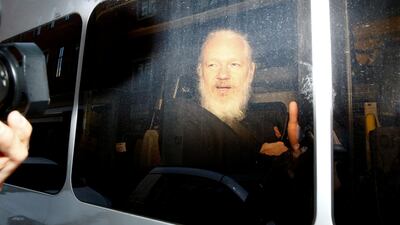WikiLeaks founder Julian Assange faces a hacking charge in the US after Ecuador ended his seven-year spell inside its London embassy as one of the world’s most famous fugitives.
Plain-clothed officers bundled Mr Assange into a waiting police van on Thursday. After a short stint at a London police station he was taken to Westminster Magistrates' Court.
If convicted of the US charges, he could be locked up for five years.
The controversial campaigner was found guilty of breaching bail conditions linked to alleged sexual crimes in 2010 in Sweden but faces further allegations from the US over his activities as head of the whistle-blowing organisation.
Mr Assange will next appear at the same court on May 2 on the extradition matter. He could face as long as 12 months in jail when he is sentenced at another court later for skipping bail.
Swedish investigators also said they would reopen their investigation into his rape case.
America wants to prosecute Mr Assange over leaks of sensitive documents linked to US wars in Iraq and Afghanistan, and the release of diplomatic messages spanning decades.
He is accused of conspiring with former intelligence analyst Chelsea Manning who leaked documents to the group, the US Justice Department said.
It claimed Mr Assange, 47, helped Manning crack the password of a Defence Department computer holding classified documents.
He has been taken into custody and will appear before a London court "as soon as is possible", police said.
A heavily bearded Mr Assange seemed to resist arrest as he was dragged down steps from the front door of the embassy by at least five people.
He was put into one of four police vans parked outside.
Mr Assange's successor as Editor-in-Chief at WikiLeaks, Kristinn Hrafnsson, said it was a "sad day for journalism".
The 47-year-old first sought refuge inside the embassy in 2012 to avoid being arrested and extradited to Sweden where he faced sexual assault charges. The arrest came the day after WikiLeaks claimed that Mr Assange was being spied on from within the Ecuador's embassy in London.
In a statement, Ecuador’s president, Lenín Moreno, blamed Mr Assange's "discourteous and agressive behaviour" for ending the safe refuge for Mr Assange inside the embassy.
"Today, I announced that the discourteous and aggressive behaviour of Mr Julian Assange, the hostile and threatening declarations of its allied organisations against Ecuador, and especially the transgression of international treaties, have led the situation to a point where the asylum of Mr Assange is unsustainable and no longer viable."
Foreign Secretary Jeremy Hunt said that President Moreno had taken a "courageous decision" since Julian Assange had been holding the Ecuadorian embassy "hostage in a situation that was absolutely intolerable for them".
The whistle-blowing organisation had warned last week that, after seven years inside the embassy, that Mr Assange could be evicted at any time. He has only been seen during brief appearances at the balcony of the embassy and in photos with guests who had visited him.
London's police said they were "invited into the embassy by the Ambassador" after the Ecuadorian government withdrew its asylum for the high-profile fugitive.
WikiLeaks said that Ecuador had "illegally terminated" Mr Assange's political asylum "in violation of international law".
The group has repeatedly expressed fears that he would be extradited to the United States if he was arrested in the UK.
Swedish authorities said on Thursday that it was "news to us" that he had been arrested but were "following developments".
A preliminary investigation into alleged rape was halted in 2017, but could be reopened with the time limit on prosecuting the crime ending in August 2020, according to a statement from the country's chief prosecutor Ingrid Isgren.
WikiLeaks claims that US President Donald Trump has put pressure on Ecuador to force Mr Assange out of the embassy. Prosecutors have reportedly been investigating him and WikiLeaks since 2011.
Mr Assange’s lawyers argue he would not receive a fair trial if he was sent to the US and could even be sentenced to death.
Foreign minister Alan Duncan said on Thursday that he would not be extradited if he faced the death penalty but welcomed the arrest following "extensive dialogue" between the two countries.
"It is our broad policy in all circumstances, so it equally applies to Julian Assange, that he will not be extradited if he is going to face the death penalty. So that will apply to him," he told Sky News. He said that it was for the courts to decide what would happen next.
Last week, Mr Moreno, accused WikiLeaks of hacking and publishing his personal data. WikiLeaks said Ecuador was using the alleged data hack as a pretext for trying to remove Mr Assange from the embassy.
The UK has kept a watch on the embassy for more than seven years to ensure he did not elude arrest in an operation that has cost millions of pounds.
Keeping a vigil at the embassy on Thursday, one of Mr Assange's supporters, Kyle Farren, 22, described the arrest as "a violation of human rights". "I'll be here as long as I need to be," he said.

